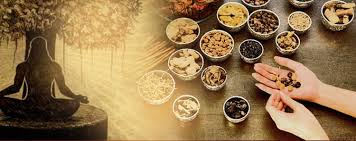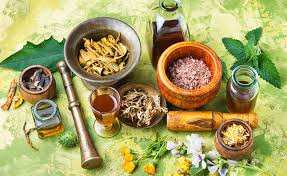

Ayurveda is more than just a popular form of alternative medicine. It is a system of holistic healing unlike any other. Thought to be over five thousand years old, Ayurvedic medicine teaches us to see the world as it relates to the elements or doshas. According to Ayurveda, everyone is born with a mixture of these three doshas- vata , pitta and kapha.
The name “Ayurveda” is derived from two words in Sanskrit, “ayuh” meaning “life” or “longevity” and “veda” meaning “science” or “sacred knowledge.” Ayurveda’s definition therefore roughly translates as “the science of longevity” or “the sacred knowledge of life.”
Based on the idea, that disease is due to an imbalance or stress in a person’s consciousness, Ayurveda encourages certain lifestyle interventions and natural therapies to regain a balance between the body, mind, spirit, and the environment.
Ayurveda treatment starts with an internal purification process, followed by a special diet, herbal remedies, massage therapy, yoga, and meditation.
The concepts of universal interconnectedness, the body’s constitution (prakriti), and life forces (doshas) are the primary basis of ayurvedic medicine. Goals of treatment aid the person by eliminating impurities, reducing symptoms, increasing resistance to disease, reducing worry, and increasing harmony in life. Herbs and other plants, including oils and common spices, are used extensively in Ayurvedic treatment.
AYURVEDA’S DEFINITION OF HEALTH
The Sanskrit word for health, swastha , is a state in which the mind, soul, and senses interact harmoniously to experience a feeling of Self, wellness, and even bliss. Achieving this may seem like a lofty goal, but Ayurveda provides a treasure chest of elegant and insightful tools to help us get there.

According to ayurveda, panchakarma are techniques to cleanse and rejuvenate the body, mind and consciousness .it is based on ayurvedic principles, every human is a unique phenomenon manifested through the five elements of ether, air, fire, water and earth.
The combination of these elements are three doshas(tridosha) and their balance is unique to each individual. When this doshic balance is disturbed it creates disorder resulting in disease.
Panchakarma is done individually for each person with their specific constitution and specific disorder in mind , thus it requires close observation and supervision.